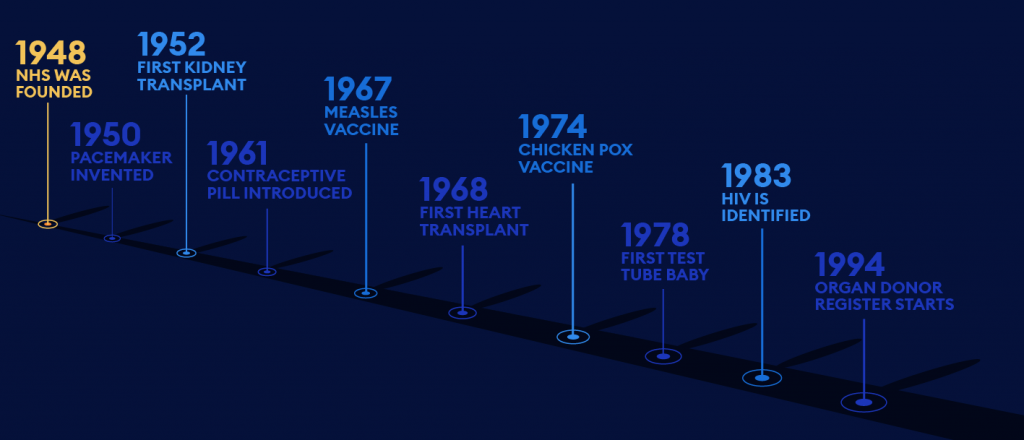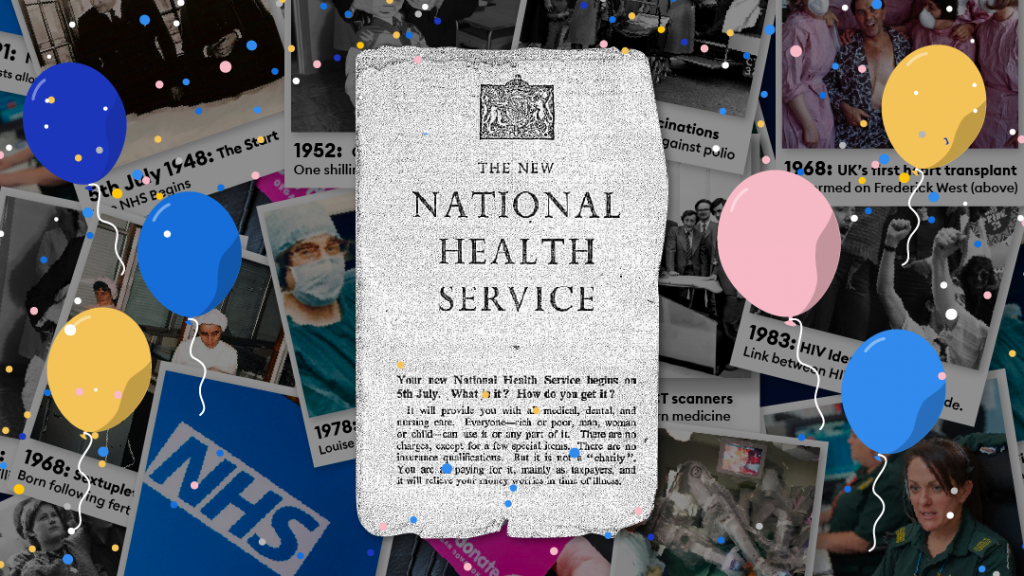Here at Health Service Discounts, we are passionate about the NHS and ensuring that its dedicated and hardworking staff receive the recognition and appreciation they deserve. In this blog, we’ll answer questions like how old is the NHS, when the is NHS’s birthday, and more.
- 1948 – The Birth of the NHS
- 1958 – First Mass Vaccination Programme
- 1961 – The Launch of the Contraception Pill
- 1968 – UK’s First Heart Transplant
- 1978 – World’s First Test-Tube Baby
- 1983 – The Mental Health Act
- 1994 – NHS Organ Donor Register Created
- 2006 – Improved Access to the IAPT programme
- 2020 – COVID-19 NHS Response
- Today
If there is one thing that we are really proud of in the UK, it is our NHS. Since launching in 1948, the NHS has come on leaps and bounds in providing excellent care and treatment for people across the country and remains an institution that we all rely on every day. Here is everything you need to know about the history of the NHS.
This year we are celebrating the NHS’ 76th birthday, making it the perfect time to see how far the service has come and look back at the poignant milestones that the service has achieved over its history.
The History of the NHS
1948 – The Birth of the NHS
The history of the NHS started on 5 July 1948 at Park Hospital, Manchester (now Trafford General Hospital), when the service was created to bring healthcare to everyone in the UK regardless of their earnings.
The ambitious project was the first of its kind and was launched by Health Secretary Aneurin Bevan. It aimed to revolutionise healthcare in the UK due to the insufficiencies of the previous system.
1958 – First Mass Vaccination Programme
This milestone saw the first mass vaccination programme against polio and diphtheria due to the epidemic that had occurred. Cases had climbed considerably and resulted in 5,000 deaths. Therefore, everyone under the age of 15 was vaccinated in the programme, which saw NHS mobile immunisation vans on the streets.
1961 – The Launch of the Contraception Pill
Another significant milestone in the NHS’s history is the launch of the contraceptive pill. It was developed by Professor Gregory Pincus and helped considerably to the changing roles of women in UK society.
While it was initially only available for married women, this was changed by law in 1967. Between 1962 and 1969 the number of women using the pill in the UK rose from 50,000 to one million.
1968 – UK’s First Heart Transplant
At the National Heart Hospital in Marylebone, London the first heart transplant in Britain was carried out. Donald Ross, a South African-born surgeon led an extensive team made up of 18 doctors and nurses to carry out the seven-hour procedure. The patient was 45-year-old Frederick West, and the donor was Patrick Ryan, a 26-year-old labourer. It was only the tenth heart transplant in the world.

1978 – World’s First Test-Tube Baby
Another pivotal moment in the history of the NHS was the development of a new egg fertilisation technique developed by Dr Patrick Steptoe and Dr Roberts Edward. They developed a process that fertilised the egg outside the body before placing it in the woman’s womb. This led to the birth of the world’s first test-tube baby in 1978. Mum Lesley Brown gave birth to a baby girl, Louise Brown.
1983 – The Mental Health Act
This was a huge turning point for the treatment of mental health in the NHS and is still the main piece of legislation used today. The Mental Health Act codified the issue of consent in treatment for mental health and set out clear rules on when and why individuals can be ‘sectioned’. The act covers the rights, assessment and treatment of those with a mental health disorder.
1994 – NHS Organ Donor Register Created
The NHS organ donor register was launched in 1994 and replaced the kidney donor card programme that had been in place since the 1970s. This scheme remains in place today, but there are still huge numbers of deaths due to the lack of organs donated.
2006 – Improved Access to the IAPT programme
This England-based scheme was designed to make it easier for people suffering from anxiety and depression disorders to get access to talking treatments as part of the NHS. This is still in place today and allows patients to either be referred by their GP or they can self-refer.
2020 – COVID-19 NHS Response
The NHS faced its toughest challenge yet in early 2020, which saw the world engulfed in the COVID-19 pandemic. From the quick development of the Nightingale hospitals due to the NHS app and hospitals all over the country being inundated with COVID-19 patients, the NHS has continued to offer unwavering support and treatment for those infected with the virus.
Today
The NHS has grown significantly and remains an incredible service that we all know and love. With over 1.7 million staff members, the NHS is one of the largest employers in the UK (and the world).
Do you work for the NHS? Get signed up for free and receive health service discounts as a thank you for all your hard work!

